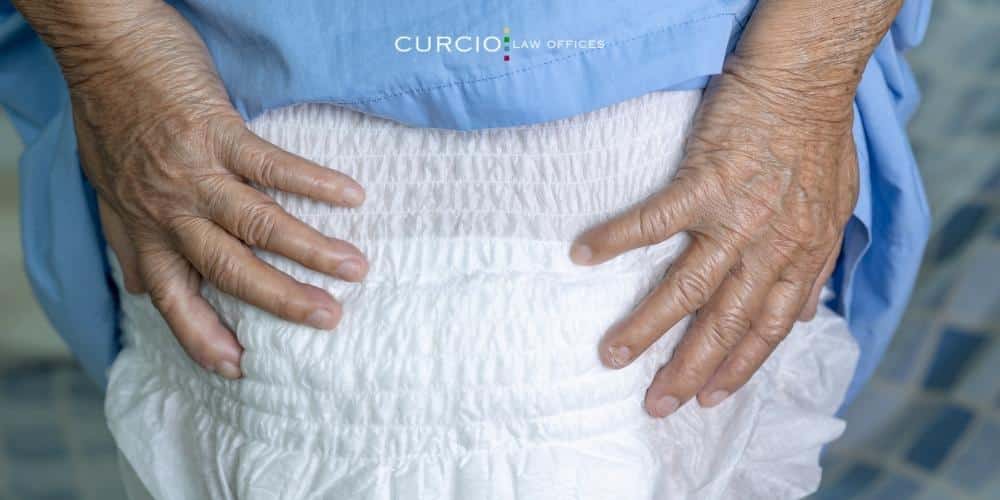CHICAGO NURSING HOME UTI LAWYER
PRACTICE AREAS
UTI in Nursing Homes
Urinary tract infections (UTIs) are an incredibly common infection among young women, especially, accounting for millions of urgent care visits on an annual basis. UTIs are even more common among postmenopausal women and nursing home residents, except the health consequences associated with the infection are much more dire within this age group. Older adults with UTIs have a much higher risk of developing kidney failure, kidney damage, sepsis, and even death, especially without prompt medical treatment. What makes this issue even more complicated is that older adults in nursing homes struggle more with antibiotic resistance, making UTIs difficult to prevent, treat, and control. Victims of UTI in nursing homes may have grounds to file an elder abuse lawsuit. Below, our Chicago nursing home abuse lawyer explains why.
Every Chicago elderly abuse attorney at Curcio & Casciato is passionate about defending the rights of elderly people in Illinois nursing homes. If your elderly family member is suffering from frequent UTI in nursing homes and UTI complications, call our Chicago personal injury lawyers today at 312-321-1111.

What is a UTI?
A urinary tract infection (UTI), also known as a bladder infection, occurs when harmful bacteria enters the urinary tract and travels up to the rest of the urinary system: the bladder, ureters, and kidneys. This causes the classic UTI symptoms of painful urination, frequent urination, bloody/cloudy urine, pelvic pain, etc.
The most common type of bacteria that causes urinary tract infections is e-coli (escherichia coli), which can be found in the lower intestine. Other common types of bacteria that can cause UTIs include staphylococcus, streptococcus, aerococcus, and enterococcus.
What is Asymptomatic Bacteriuria?
Asymptomatic bacteriuria is basically a urinary tract infection without the severe symptoms. In other words, doctors will find harmful bacteria in a urine sample of a person who isn’t exhibiting UTI symptoms. This condition can be incredibly dangerous for people of any age. UTI symptoms are responsible for notifying you that there’s an infection. If you have a UTI but don’t have symptoms, you could easily develop a kidney infection (or, in severe cases, one of the three stages of sepsis) due to the lack of medical care.
According to the CDC, older adults in long-term care facilities have a higher prevalence of asymptomatic bacteriuria – ranging from 25% to 50% – compared to symptomatic urinary tract infections.
Our Chicago nursing home infection lawyer can help your family pursue compensation for medical treatment if your loved one sustained injuries due to preventable infections.
How Many People Suffer From UTIs Every Year in the U.S.?
UTIs are incredibly common infections, mostly among women, because their urethras are much shorter than men’s. Therefore, the harmful bacteria don’t have to travel up as far.
In fact, a 2016 study claims that urinary tract infections accounted for 10.5 million doctor’s office visits and at least 2 million ER visits in 2007 alone.
Postmenopausal women and elderly people have a higher chance of developing a UTI compared to younger people. A 2014 study states that UTI’s are one of the most commonly diagnosed infections in nursing homes. More specifically, these infections account for more than one-third of all nursing home infections. Another study claims that urinary tract infections are the second most commonly diagnosed infection among the older population, behind respiratory infections.

Why Older Adults Are More At Risk for UTI’s
The last sentence begs the question: why are older adults more at risk for urinary tract infections? In short, elderly people have a much weaker immune system compared to the rest of the population, making them more susceptible to all sorts of infections. Other urinary tract infection risk factors include:
- Pre-existing health conditions such as diabetes, obesity, bladder/kidney stones, or functional abnormalities of the urinary system
- Catheter use
- Diaper use
- Nursing home misconduct
- Cognitive illnesses such as Alzheimer’s disease and dementia
- Dehydration
- Sexually transmitted infections, if the older adult is sexually active or is a victim of sexual abuse
- An estrogen deficiency, which is incredibly common in post-menopausal women
Symptoms of UTIs in Older Adults
Older adults generally have the typical UTI symptoms that younger adults have, including:
- Painful urination
- Frequent urination
- Bloody or cloudy urine
- Pelvic pain
- Fever and chills
- Incontinence
- Foul smelling urine
- Nausea, vomiting, and lower back pain if the infection spreads and becomes a kidney infection
UTI-Induced Delirium
Other symptoms of a UTI that older adults frequently experience (not so much younger people) are delirium and agitation. This is especially the case if the elderly person has Alzheimer’s disease or dementia.
The connection between urinary tract infections and UTI delirium in older adults isn’t well studied or understood. In fact, a 2014 study states:
“Though the studies examined conclude that there is an association between UTI and delirium, all of them had significant methodological flaws that likely led to biased results. Therefore, it is difficult to ascertain the degree to which urinary tract infections cause delirium. More research is needed to better define the role of UTI in delirium etiology.”
2014 Study: Delirium, a Symptom of UTI in the Elderly: Fact or Fable? A Systematic Review
A 2021 report from Cedars Sinai suggests that a protein called interleukin 6 (IL-6), which is part of the immune system, may play a huge role in UTI-induced delirium in the elderly. This protein helps regulate the immune response. The report states that when the IL-6 response is excessive, it can potentially cause a brain injury, especially in individuals with weakened immune systems. Dr. Shouri Lahiri, the director of the Neurosciences Critical Care Unit and Neurocritical Care Research at Cedars-Sinai, states:
“A wealth of studies have shown a link between IL-6 and delirium, but only this study and our previous study have shown that IL-6 may play a direct pathological role in delirium.”
Dr. Shouri Lahiri, the director of the Neurosciences Critical Care Unit and Neurocritical Care Research at Cedars-Sinai
Dr. Lahiri plans to create a series of clinical trials in which older adults with UTI-induced delirium are treated with anti-IL-6 antibodies.
What Causes Nursing Home UTIs in Illinois?
Nursing home residents tend to suffer from more urinary tract infections than the younger population because of weakened immune systems. Another common culprit is catheter use because many elderly people struggle to use the bathroom by themselves. Catheters that stay inside the urethra and bladder for days at a time cause bacteria to develop rapidly, especially if the catheter wasn’t sanitized to begin with.
A nursing home resident may also develop a UTI due to nursing home neglect and abuse. Many nursing home patients also need diapers because they struggle to use the bathroom by themselves. Tragically, many nursing home staff members allow their residents to sit in their own waste for hours at a time. This is considered neglect. Sitting in a dirty diaper for hours creates the perfect opportunity for e-coli to get into the urethra.
Another example of nursing home abuse and neglect that can lead to a urinary tract infection is poor hygiene. Poor hygiene goes hand in hand with the diaper issue. If nursing home staff fail to help residents bathe every day, they can have a higher risk of developing a UTI. Additionally, if staff members fail to change their residents’ sheets, towels, and clothes frequently enough, nursing home residents can also develop a UTI.
What Happens to the Elderly With Untreated UTI?
Elderly adults have a higher risk of developing medical complications related to urinary tract infections, especially if they go undiagnosed and untreated. For example, elderly adults can suffer permanent kidney damage or even kidney failure due to a UTI. Additionally, elderly adults can easily develop septic shock and eventually die from an untreated UTI. That’s why nursing home residents must have top-notch hygiene and medical care. Their lives quite literally depend on it.
If this happens to your loved one, our Chicago nursing home sepsis attorneys or Chicago nursing home wrongful death lawyers can handle your case with compassion.
What is the Nursing Care of Patients with UTI?
When a patient goes to a doctor complaining of UTI symptoms, the doctor will likely take a urine culture, prescribe antibiotics, and send them home. The most common types of antibiotics used to treat UTIs in all ages are amoxicillin (Macrobid), nitrofurantoin (Macrodantin), ciprofloxacin (Cetraxal), and levofloxacin (Levaquin). Certain antibiotics kill certain types of bacteria, which is why the urine culture is so important. Doctors take a urine culture to determine the specific type of bacteria causing the infection, and then they prescribe the best antibiotic to kill that bacteria.
In most cases, the antibiotics will completely get rid of the infection. But if someone is frequently plagued with UTIs and therefore has to take antibiotics regularly, they may develop antibiotic resistance. This means that the bacteria develop the ability to beat the antibiotic.
Unfortunately, antibiotic resistance is a major problem among nursing home residents due to the amount of UTIs and other infections they suffer on an annual basis.
This means that the antibiotics aren’t enough to kill the bacteria causing the infection, which raises their chances of UTI recurrence/reinfection, kidney infection, kidney failure, sepsis, and death. When a UTI becomes life-threatening for an older person, their doctor may administer strong intravenous antibiotics to kill the infection and save their life.
Antibiotic stewardship is legally required for Illinois nursing homes, but until enough victims press the issue, they’ll continue as they have been.
UTI Prevention in Nursing Homes
Because of the increasing rates of antibiotic resistance in nursing homes, it’s crucial for staff members to lean into UTI prevention methods. If the staff members at your loved one’s nursing home are failing to take the following precautions after several UTI’s, you may have grounds to file a nursing home abuse and neglect lawsuit.
- Encouraging the elderly person to drink plenty of water
- Administering IV fluids if the elderly person refuses to drink water and becomes dehydrated
- Changing diapers and pee pads frequently
- Ensuring that the elderly person has good hygiene in the bathroom (wiping front to back)
- Ensuring that the elderly person bathes daily
- Making sure that the elderly person has clean clothes, sheets, and towels
- Prescribing vaginal estrogen suppositories
- Helping elderly people walk to the bathroom

Chicago Nursing Home Abuse Lawyers for UTIs in Nursing Homes
UTI in nursing homes can certainly be a sign of nursing home neglect and abuse. If your elderly loved one is suffering from frequent urinary tract infections that are turning into life-threatening conditions (kidney failure/damage or sepsis), you may have grounds to file a lawsuit. The legal team at Curcio & Casciato has what it takes to successfully litigate nursing home abuse cases. In fact, we have recovered more than $500,000 in settlements on behalf of the family members of abused elders. Call a Chicago nursing home abuse and neglect lawyer at our law firm at 312-321-1111 today. We offer a free consultation to all new clients.


